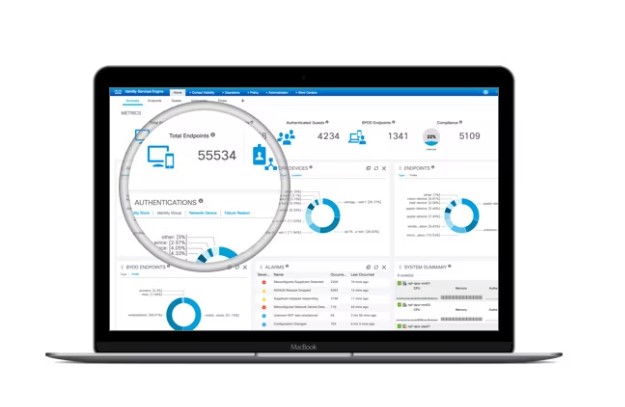What are Identity Services & Benefits?
September 14, 2023 •Network Solutions

Identity services, also known as identity management services or identity and access management (IAM) services, are a crucial component of modern information technology systems and cybersecurity. They are designed to manage and secure digital identities, ensuring that the right individuals have the appropriate access to various resources, systems, and data within an organization. Here's what you should know about identity services:
- Definition of Digital Identity: Identity services deal with digital identities, which are representations of individuals or entities within a computer system or network. These identities are used to authenticate, authorize, and track users' interactions with IT resources.
- Authentication: One of the primary functions of identity services is authentication. This process verifies the identity of a user or entity trying to access a system or application. Common authentication methods include usernames and passwords, multi-factor authentication (MFA), biometrics (fingerprint or facial recognition), and smart cards.
- Authorization: Once a user's identity is authenticated, identity services manage authorization. This involves determining what level of access or permissions the authenticated user should have within the system. This is often based on roles, groups, or policies defined by the organization.
- Single Sign-On (SSO): SSO is a feature of identity services that allows users to log in once and access multiple applications and resources without needing to re-enter credentials for each one. This enhances user convenience while maintaining security.
- User Lifecycle Management: Identity services help manage the entire lifecycle of a user's digital identity, including onboarding, changes in roles or permissions, and offboarding when an individual leaves the organization. This ensures that access is granted and revoked appropriately.
- Password Management: Identity services often include password policies, such as requiring strong passwords and enforcing password changes at regular intervals. They may also provide self-service password reset functionality for users.
- Auditing and Logging: Identity services maintain logs and audit trails of user activities, which can be crucial for compliance, security, and troubleshooting purposes.
- Security and Compliance: Identity services play a crucial role in maintaining security and compliance within an organization. They help enforce security policies, access controls, and compliance requirements by ensuring that users only have access to the resources they are authorized to use.
- Federation: Federation allows users to access resources across different organizations or domains using their own identity credentials. Identity services often support federation protocols such as Security Assertion Markup Language (SAML) and OpenID Connect.
- Multi-Factor Authentication (MFA): Many identity services offer MFA as an additional layer of security. MFA requires users to provide multiple forms of verification, adding an extra barrier to unauthorized access.
- Cloud Identity Services: With the increasing adoption of cloud-based services and applications, cloud identity services have become essential. These services extend identity management to cloud environments and ensure seamless and secure access to cloud resources.
- Identity as a Service (IDaaS): IDaaS is a cloud-based approach to identity services, providing organizations with the flexibility to manage identities and access controls in a scalable and cost-effective manner.
- Vendor Solutions: Numerous vendors offer identity management solutions, such as Microsoft Azure Active Directory, Okta, OneLogin, Ping Identity, and more. Organizations choose these solutions based on their specific requirements and infrastructure.
Effective identity services are critical for maintaining the security, privacy, and compliance of digital systems. They help organizations protect sensitive data, prevent unauthorized access, and ensure that users have the appropriate level of access to perform their job duties.
Watch NSI Enterprise Architect Jeremy walk you through Identity Services scenarios to help you further understand the WHY and HOW of Identity Services so critical to your organization's security strategy!
Cisco Identity Services Engine (Cisco ISE) is a comprehensive identity and access management (IAM) solution. While it shares some common features with other IAM solutions, Cisco Identity Services has its unique characteristics and advantages that set it apart:
- Integration with Cisco Ecosystem: One of the standout features of Cisco Identity Services is its seamless integration with other Cisco products and services. This includes network infrastructure components like Cisco switches, routers, and firewalls. This tight integration allows for enhanced security policy enforcement, network visibility, and easier deployment of security measures.
- Network-Based Access Control: Cisco Identity Services leverages network-based access control to enforce policies. This means that it can dynamically adjust access permissions based on factors like user identity, device type, location, and threat intelligence. It goes beyond traditional identity-based access control by taking into account contextual information.
- Policy Enforcement at the Network Edge: Cisco Identity Services is often implemented at the network edge, allowing organizations to enforce access policies before traffic enters the internal network. This helps in preventing threats from reaching critical resources.
- Secure Access Everywhere: It provides secure access to resources from anywhere, including remote and mobile users. With the increasing trend of remote work, this is particularly valuable, as it ensures that remote users can access resources securely.
- Zero Trust Security: Cisco Identity Services aligns with the Zero Trust security model, which assumes that no one should be trusted by default, whether they are inside or outside the network perimeter. This approach emphasizes continuous verification and least privilege access.
- Scalability: Cisco Identity Services is designed to scale with an organization's needs. Whether you have a small business or a large enterprise, it can accommodate the user and device growth without compromising on performance.
- Advanced Threat Detection and Response: It incorporates advanced threat detection and response capabilities, allowing organizations to detect and respond to security threats more effectively. It can provide insights into user and device behavior for anomaly detection.
- Cloud and On-Premises Support: Cisco Identity Services offers the flexibility to deploy both in the cloud and on-premises, catering to the specific infrastructure and compliance requirements of an organization.
- Extensive Ecosystem: Cisco Identity Services is part of Cisco's broader security and networking ecosystem, which includes a wide range of security products and services. This integration can simplify security management and provide a holistic approach to security.
- Compliance and Reporting: It offers compliance reporting and auditing capabilities to help organizations meet regulatory requirements and demonstrate compliance with security policies.
- User-Friendly Interfaces: Cisco Identity Services typically comes with user-friendly interfaces and dashboards, making it easier for administrators to configure and manage policies.
Cisco Identity Services Engine (ISE) is unique in its deep integration with Cisco's networking and security ecosystem, network-based access control, and its alignment with the Zero Trust security model. These features make it a strong choice for organizations looking to enhance their security posture, particularly in complex network environments. However, the choice of an IAM solution should be based on an organization's specific needs, so it's essential to evaluate different options and consider how they align with your security and infrastructure requirements.
Schedule a consultation If you would like to learn more about Cisco ISE or talk with our security experts at Network Solutions to discuss your security strategy.
Get Updates
Featured Articles
Categories
- AI (19)
- Automated Technology (10)
- backup (1)
- Cisco (33)
- Cisco Live Update (1)
- Cisco News (2)
- Cisco UCS (1)
- Cloud Networking (5)
- Collaboration (26)
- compute (1)
- CyberSecurity (36)
- Data Center (33)
- Defense (1)
- DevOps (3)
- DisasterRecovery (1)
- DNA (2)
- Education (3)
- Encryption (1)
- Enterprise Networking (34)
- Full-Stack (1)
- Future (1)
- healthcare (2)
- hybrid cloud (1)
- Hybrid Cloud Strategy (1)
- Hyperconverged Infrastructure (1)
- Infrastructure Cost Optimization (1)
- Innovation (1)
- Innovative Technology (12)
- Internet of Things (2)
- IoT (2)
- Managed Services (11)
- Manufacturing (1)
- Modern Data Center (2)
- Monitoring (2)
- Network Management (4)
- Networking (3)
- NSI (1)
- nutanix (1)
- Observability (1)
- OT (1)
- Ransomware (2)
- SchoolTechnology (6)
- SD-WAN (1)
- SDN (1)
- securit (1)
- Security (77)
- security management (6)
- security strategy (9)
- SSE (2)
- sustainability (1)
- Telehealth (4)
- Telemedicine (1)
- veeam (1)
- Video (1)
- videoconferencing (1)
- Virtualization (2)
- VMware to Nutanix (2)
- webex (3)
- wifi (1)
- XDR (1)
- Zero Trust (8)






